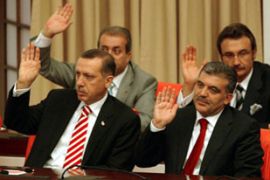Gul faces second presidency vote
Turkey’s parliament divided over the ruling party candidate.

Secularist Turks and the main opposition Republican People’s Party (CHP) remain hostile to Gul’s bid, arguing that his presidency would undermine the country’s secular system.
‘Guaranteed’
“His election as president is as good as guaranteed. Next week he will get the sufficient number of votes and will be sworn in with lightning speed on the same evening,” Mehmet Ali Birand, a leading Turkish columnist, said.
| “Next week he will get the sufficient number of votes and will be sworn in with lightning speed on the same evening” Mehmet Ali Birand, columnist |
Deadlock in parliament during his first attempt to secure the presidency led Gul to abandon his bid, but Recep Tayyip Erdogan, the prime minister, renominated him as its presidential candidate, after his party’s success in July’s early parliamentary elections.
Gul received 341 votes in a first round of voting on Monday while his closest opponent, Sebahattin Cakmakoglu, of the Nationalist Action Party, got just 70.
The CHP was absent during the first-round vote, showing its continued opposition to Gul’s attempt to become president.
Gul’s wife has been criticised by some secularists for wearing a headscarf, which Mustafa Kemal Ataturk, secular Turkey’s founder, banned in daily life.
The ban has been enforced in public offices and schools since a military coup in 1980.
Secularism
The country of 74 million people is predominantly Muslim but is governed by a secular constitution.
The military, which traditionally sees itself as the guardian of secularism, has ousted four governments since 1960.
Gul has pledged loyalty to Turkey’s constitution and promised neutrality, while Erdogan has said that Gul’s membership in the party they founded in 2001 would end the minute he is elected president.
He says people should judge him for his record in office, where he helped win talks on joining the European Union and improved Turkey’s human rights record.
The presidency is a largely ceremonial post but its incumbent does have the power to veto laws and official appointments, as well as name judges.